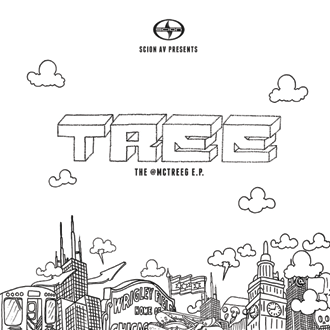
The reduction of Chicago’s rap scene to a hotbed characterized by dueling ideologies is too tempting for some journalists to avoid. This pitting of nihilistic drill rapper against the wily, post-Kanye soul-samplers is, oftentimes, too simple. Tragically, artists in the middle, the ones who straddle the line between genres often get lost in the shuffle.
Tremaine “Tree” Johnson typifies the tragedy of being caught in the middle better than any other MC in Chicago. He is the pioneer of soul trap–a style characterized by its position in between the two extremes of Chief Keef’s aggressive drill rap and Save Money’s sophisticated lyricism. The genre’s melding of warbled soul samples, aggressively synths and pulverizing percussion is stylistically refreshing. When paired with MC Tree’s Louis Armstrong-esque rasp, this makes for a unique sonic experience. “The term Soul Trap came about when a local rapper, Fatboy Fresh, told me to mark my territory by giving the style a name,” Tree revealed over a phone interview, “it was the best advice I ever got.”
“Sunday School,” a thumping nostalgia trip that hearkens back to times spent at the Salem Baptist Church of Chicago, was Tree’s first foray into the rap world. This project provides one of the best examples of soul trap’s origins. . On the follow-up, “Sunday School II: When Church Lets Out,” Tree irons out some of the creases from his earlier effort, delegating production duties to other beat-makers and recruiting some impressive featured artists, including Danny Brown on the truly stellar track “No Faces.” Overall, this follow-up album is more focused and polished, both lyrically and in terms of production, than his debut.
On his most recent release,”The @MCTreeG EP,” Tree charts familiar lyrical territory. Sticking to the fundamentals of soul trap, he succeeds in building upon an already impressive body of work. The album more than compensates for its relatively short length with a slew of punchy tunes designed to send the eardrums into a frenzy.
“Probably Nu It” is a solid opener. Here Tree assumes the dual role of scat singer and shaman practitioner, delivering incomprehensible incantations over a repetitively hypnotic beat. The song, which Tree revealed was a late addition to the album, subverts the concept of the “cheater’s lament.” It is instead an exercise in smug self-congratulation. This is followed by the equally catchy “Like Whoa”, a spirit-rousing celebration of resilience in the face of despair. The song condenses the basic idea that pervades all of Tree’s work: a desire to make good music that has universal appeal. “I find that me talking about gang-banging or True Religions amounts to cheating someone of the Tree experience,” he confesses. “I can’t play that role.”
“Soultrappin’/I Believe,” the most Chicago-centric song on the album, completes the strong opeing trio , showcasing Tree at his most impassioned. He voices his misgivings about the superficialities that have infiltrated rap culture, criticizing in particular the glorification of rappers based on their fashion rather than their lyrical prowess or social concerns. The production on this track stands out for its use of everything from a sampled baby’s cry to the gentle strumming of an out-of-tune guitar.
The three songs that follow are solid, if unspectacular. “Stay Away”, the most autobiographical number on the album, follows an intense narrative set in what appears to be Tree’s very own, now demolished, Cabrini-Green housing projects. The track is lyrically dense, with Tree waxing eloquent about everything from picking up girls and dealing drugs to occupational paralysis and the mainstream media’s exploitation of tragedy. “Grace” and “Uh Million” are both collaborations that, while fun, lack the energy and ingenuity of the tunes that precede them. The album concludes with “God Like”, a largely beat-driven track that captures the paradoxical nature of the artist’s relationship with fame.
On the whole, “The MCTreeG EP” fits nicely within Tree’s musical ideology: “kind of like Jambalaya—an infusion of soul, RnB, hip hop Jazz, it’s a culmination of that and it’s sizzling hot.” This is true enough, and especially impressive given the fact he manages to weave together these varied sonic textures without producing an effort that is muddled or overwrought. Tree’s brand of soul trap has managed to avoid being labeled as a “fad” while still remaining relevant and refreshing.
